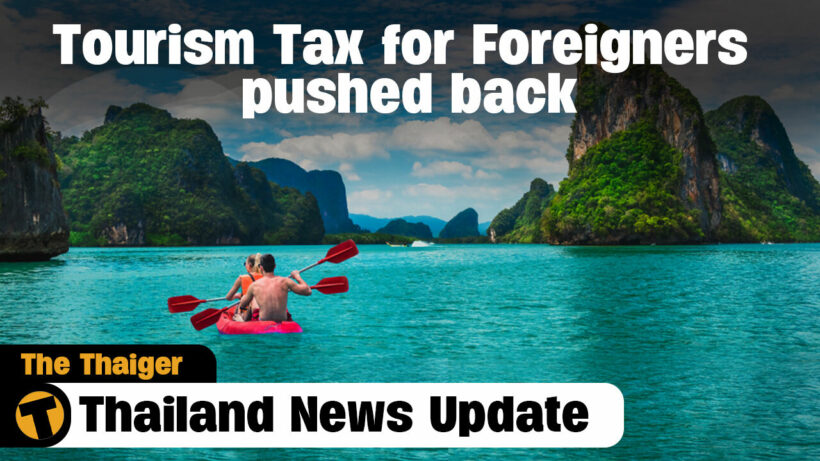Thailand News Update | Tourism Tax for Foreigners pushed back

Thailand’s PM has pushed back the introduction of a 300 baht ‘entry fee’ for international tourists arriving in the kingdom. Since Test & Go, Sandbox and other entry restrictions were dropped on May 1, Thailand has experienced a surge in international arrivals. If tourism levels continue to climb and significantly improve national income this year, it might not be necessary to introduce the entry fee… yet, according to PM Prayut Chan-o-Cha.
However, the tourist ministry has earlier suggested the fee could be introduced in August or September this year.
A tourist tax, arrival or departure tax, is nothing new. The ‘surcharges’ have been added from time to time in the past. Tourist ‘taxes’ of up to 500 baht have been levied in the not-so-distant past of Thai tourism.
Introducing a Thailand Tourism Fee – or TTF – is not as simple as it sounds. If airlines include the surcharge as part of their airfare, they will have to find a way of exempting Thai nationals, government officials, diplomats, foreigners with work permits and children under the age of 2, according to guidelines set by Thailand’s Tourism and Sports Ministry.
If you are a foreign retiree or married to a Thai, but don’t hold a work permit, you might still need to pay the fee upon entry to Thailand even if you don’t consider yourself a ‘tourist’.
Government spokesperson Thanakorn Wangboonkongchana said the extra cash would act as ‘tourist insurance’ and help pay for medical bills in the event that a tourist got into an accident, which is a common occurrence.
Authorities in Bangkok are preparing to shift gears in their Covid-19 strategy to an ‘endemic phase’, as the Thai Public Health Ministry acknowledges a steep drop in infections and deaths. According to a Nation Thailand report, Kiattiphum Wongrajit from the health ministry says the vaccine rollout, coupled with home isolation programmes and outpatient schemes, has contributed to the significant improvement in the capital’s Covid-19 situation.
Before Songkran, pessimistic predictions thought that daily cases of Covid could exceed 100,000 infections. The daily numbers headed in the opposite direction and have been under 10,000 for 3 days now. Daily deaths are also trending swiftly downward.
Nearly all Bangkok residents have now received 2 doses of a Covid-19 vaccine, with around 60% of residents having had at least 1 booster dose. Kiattiphum says this high vaccination rate means the capital is ready to manage Covid-19 as an endemic illness.
The health ministry is now working with various Bangkok agencies on a gradual easing of Covid-19 restrictions. During the move to endemic, the focus will remain on managing high-risk areas such as pubs, bars, public transport, and public parks, with Kiattiphum expressing hope that the shift to endemic will be smooth.
If Thailand’s PM Prayut Chan-o-cha fails to hold his position as prime minister, “there may be a substitute prime minister”, …that’s according to deputy PM Prawit Wongsuwan.
However, PM Prayut said he hasn’t heard anything about a potential stand-in for his post.
PM Prayut’s position could be undermined in an upcoming censure debate in Parliament, brought about by opposing political parties, opening up the opportunity for a substitute PM to step in.
The no-confidence debate, expected to take place sometime after May 22, will discuss whether PM Prayut is still deemed fit to hold his premiership. Even the prime minister’s political supported in the coalition are reportedly not happy that PM Prayut keeps refusing to reshuffle the cabinet and promote them into better positions.
More than a dozen MPs from Prayut’s ruling party – Palang Pracharat – have left the party and set up the Setthakit Thai, or “Thai economic” party. PM Prayut’s position could be at risk if Setthakit Thai MPs, or MPs from other coalition parties, choose to vote against him in the debate
Secretary-general of Setthakit Thai Thammanat Prompow, who was expelled from PM Prayut’s party in January, allegedly demanded 2 seats in the Cabinet in return for supporting the government. He will be wanting his political pound of flesh after being undermined by Prayut.
PM Prayut, Deputy PM Prawit and Thammanat used to have amicable relations before Thammanat challenged PM Prayut’s power in a no-confidence vote last year. Prawit has consistently mentored Thammanat, fracturing his long-standing relationship with the the PM. Setthakit Thai MPs now describe Prawit as “the best candidate” for the premiership.
Another threat to PM Prayut’s position is the debate around whether his premiership has hit the 8-year constitutional limit or not. Thailand’s constitution says, “the prime minister shall not office for more than eight years in total.” However, people can’t agree whether Prayut became PM in 2014 (when the Army took power in the most recent coup), 2017 (when the NCPO was dissolved and a new constitution came into effect) or in March 2019 when the country held a general election and both Houses of Parliament voted Prayut into the top job.
The tourism authority of Thailand or TAT have suggested its latest scheme to hotels, called the “we travel together” hotel subsidy scheme in which suggests that hotels could offer a 50% discount for an additional 1 million room nights.
TAT governor Yuthasak Supasorn’s plan was for the remaining 4-billion-baht budget for the We Travel Together scheme to be used for a 40% subsidy on 1 million room nights, and asked hotels to add another 1 million rooms to this programme. Adding that cooperation from hotels was important to stimulate domestic trips without solely depending on a government budget, particularly when this market was being challenged by growing outbound demand driven by easier travel rules.
However, not many hoteliers were in agreeance with this suggestion.
The president of the Thai Hotels Association, said most hotels have already reduced their room rates by 50%.With a limited budget, she said the government should instead offer a 20% subsidy, instead of 40%, to cover 2 million room nights.
The acting president of the Chon Buri Tourism Council, chimed in adding that hoteliers might be reluctant to add their rooms to this programme because of the delayed payments for participants. Stating that even though this problem has been rectified recently, some hotels in Pattaya had to wait since December to get paid.
Moreover, mid-level hotels are concerned about feedback as local tourists using the privileges usually opted for five-star hotels or international chains in prime locations.
A Japanese businessman died in a motorbike accident on a mountain in Chiang Rai province, northern Thailand, yesterday. His 10 year old daughter is seriously injured and is being treated at Mai Sai hospital.
Yesterday, 52 year old Shimizu Masaeki was taking his 10 year old daughter up Doi Pha Hee mountain in Chiang Rai province when he is thought to have lost control and come off the road. Siam Ruamjai Rescue Unit discovered Shimizu’s body in the grass and found his seriously injured 10 year old daughter lying near him, who was urgently taken to receive treatment at Mae Sai hospital. Details of the child’s injuries are unknown.
The incident happened between Pong Ngam subdistrict and Wiang Pham Kham subdistrict in Mae Sai district, Chiang Rai province.
Masaeki was a managing director of a private asset management company in Pathumwan District in Bangkok. Masaeki’s wife is from Mai Sai district in Chiang Rai.
Police collected evidence at the scene and are interviewing eyewitnesses to determine the cause of the accident.
Covid-19 cases have decreased significantly in Vietnam in recent weeks. On Tuesday, Vietnam reported 0 deaths from Covid-19 for the first time since July 25 last year, according to the Health Ministry.
Vietnam’s once-strict entry requirements have mostly been dropped in an effort to boost the country’s weakened economy.
No Covid-19 deaths were reported in Vietnam on Tuesday and the country saw 2,709 new infections that day. Most cases are concentrated in Hanoi, Phu Tho and Yen Bai.
When Vietnam closed its borders in March 2020, the country enforced some of the strictest travel regulations in the world. For much of 2021, only Vietnamese citizens, students and workers with specific special skills were permitted entry into Vietnam.
Now that Covid-19 cases are declining and most of the population are vaccinated, Vietnam has eased its entry restrictions in a bid to revive its struggling economy.
The Supreme Court in military-ruled Myanmar on Wednesday struck down an appeal from deposed leader Aung San Suu Kyi against a five-year jail sentence she was handed last week on corruption charges.
Aung San Suu Kyi had been found guilty last week, in the first of 11 corruption cases brought against her.
Suu Kyi has been under house arrest on charges ranging from corruption to treason – potentially carrying a combined sentence of 190 years – since the military last year overthrew an elected government that she had led.
The Supreme Court’s dismissal further diminishes any chance of a political comeback for the long-time symbol of resistance against the junta.
The Chinese capital Beijing shut dozens of metro stations and bus routes yesterday in its campaign to stop the spread of Covid-19 and avoid the fate of Shanghai where millions of residents have been under strict lockdown for more than a month.
The capital will extend other Covid-19 curbs beyond the May Day holiday, including closures of entertainment venues and gyms as hidden community-level transmission has been discovered through screenings
The authorities will continue to cap people flows at public venues at 50 per cent and restaurants will continue suspending dining in,
Beijing will, however, cut the time that people have to stay in quarantine facilities when they arrive in the city from overseas to 10 days. Such people currently have to stay in a quarantine facility in the capital for at least 14 days. They will still need to isolate at home for seven days after quarantine.
New evidence has emerged that China’s uncompromising battle against the coronavirus, first reported in a market in the city of Wuhan in late 2019, is undermining its growth and hurting the international companies invested there.
The capital shut more than 60 subway stations, about 15 per cent of the network, and 158 bus routes, service providers said. Most of the suspended stations and routes are in the Chaoyang district, the epicentre of Beijing’s outbreak.
With dozens of new cases a day, Beijing is trying to avoid a full lockdown, as Shanghai also did initially, instead hoping that mass testing will find and isolate the virus before it can spread.
The city of 22 million people has closed schools as well as some businesses and residential buildings in high-risk areas, and many people are stocking up in case a full lockdown does come.
Latest Thailand News
Follow The Thaiger on Google News:


























